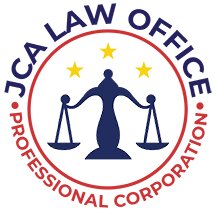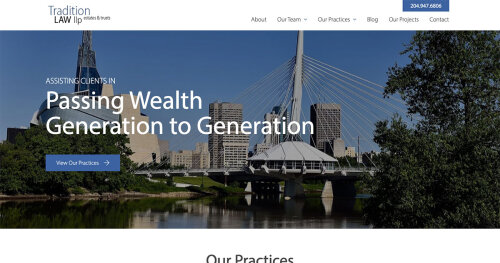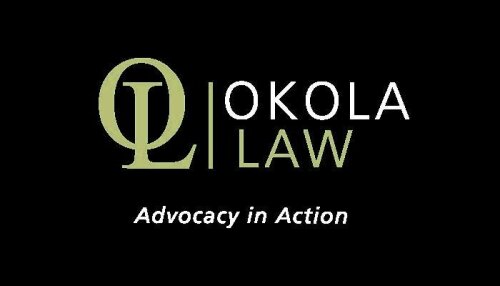Best Estate Planning Lawyers in Canada
Share your needs with us, get contacted by law firms.
Free. Takes 2 min.
Or refine your search by selecting a city:
List of the best lawyers in Canada
About Estate Planning Law in Canada
Estate planning in Canada involves the process of arranging the management and disposal of a person's estate during their life and after death. It ensures the wishes of the individual are respected, provides for their family and loved ones, and can help minimize taxes and legal fees. Estate planning encompasses wills, trusts, powers of attorney, and sometimes even funeral arrangements. It's an essential practice for anyone who wants to ensure their affairs are in order and their heirs are taken care of after they pass away.
Why You May Need a Lawyer
While some aspects of estate planning can be straightforward, there are many scenarios where legal expertise is invaluable:
- Complex Estates: If you have a large estate with various assets and investments that need careful management, a lawyer can help organize and plan their distribution.
- Business Ownership: Owning a business complicates estate planning, as succession planning needs to be incorporated.
- Blended Families: Ensuring fair distribution among family members, especially in blended families, requires legal navigation.
- Disabled Beneficiaries: Special provisions might be necessary for beneficiaries with disabilities or special needs.
- Minimizing Taxes: Professional advice can be crucial to strategically minimize taxes to maximize the estate's value to beneficiaries.
- Dispute Prevention: Legal counsel can help draft clear, unambiguous documents to prevent family disputes.
- Updating Documents: When significant life events occur, such as marriage, divorce, or the birth of a child, a lawyer can ensure your estate plan reflects these changes.
Local Laws Overview
Estate planning in Canada is largely governed by provincial and territorial laws, which means the rules can vary significantly from one place to another. However, some key aspects are common:
- Wills: A will must be properly signed and witnessed to be valid. If a person dies without a will, provincial intestacy laws determine how the estate is divided.
- Trusts: These legal entities can be established to manage assets during an individual’s lifetime or after their death.
- Powers of Attorney: Legal documents that allow a person to appoint someone else to manage their affairs if they become incapacitated.
- Probate: The legal process by which a will is validated. Some provinces offer simpler procedures for small estates.
- Family Law Implications: Marriage, divorce, and common-law partnerships can impact estate planning, affecting how property is distributed.
- Tax Considerations: Different provinces have rules regarding estate taxes and capital gains, affecting estate distribution and planning strategies.
Frequently Asked Questions
1. What happens if I die without a will in Canada?
If you die without a will, your estate is distributed according to the intestacy laws in your province, which may not reflect your personal wishes.
2. Can I prepare my own will?
Yes, you can prepare your own will, but it must meet the legal requirements to be valid. It’s often recommended to seek legal counsel to avoid mistakes that could invalidate the will.
3. What is probate, and is it necessary?
Probate is the legal process that confirms a will’s validity. It may or may not be necessary depending on the estate's complexity and whether assets are jointly held.
4. How does a trust work in estate planning?
A trust allows a third party, or trustee, to hold and manage assets on behalf of beneficiaries. It can provide greater control over asset distribution and tax benefits.
5. What is a power of attorney?
A power of attorney is a legal document that grants someone the authority to make decisions for you in financial or health matters if you're unable to do so yourself.
6. How often should I update my estate plan?
Your estate plan should be reviewed regularly, especially after major life events like marriage, divorce, or the birth of a child.
7. Are life insurance policies part of an estate plan?
Yes, life insurance can be a critical component, providing liquidity and covering expenses like taxes and debts, ensuring your beneficiaries receive the intended amounts.
8. How can I minimize taxes on my estate?
Strategies like setting up trusts, charitable donations, and joint ownership can help minimize taxes, but professional advice is crucial for effective tax planning.
9. What should be included in an estate plan?
An estate plan typically includes a will, power of attorney, healthcare directives, and may also involve trusts or life insurance.
10. Can digital assets be included in estate planning?
Yes, it's important to include directions for digital assets, like online accounts and digital currencies, in your estate planning process.
Additional Resources
The following resources can provide further guidance and information regarding estate planning in Canada:
- The Government of Canada's official websites often provide resources on wills, estates, and tax regulations.
- Public Legal Education and Information organizations available in each province can be invaluable.
- Canadian Bar Association: Offers information and resources for finding legal professionals specializing in estate law.
- Provincial Law Societies: Each province has its own Law Society, which can help in finding qualified estate lawyers.
- Legal Clinics: Many offer free or low-cost services for individuals with limited means needing legal assistance.
Next Steps
If you need legal assistance in estate planning, consider the following steps:
- Assess Your Needs: Identify your assets, beneficiaries, and specific goals for your estate distribution.
- Research Professionals: Look for lawyers specializing in estate law within your province, ensuring they have good reviews and appropriate qualifications.
- Consult a Legal Expert: Arrange a consultation to discuss your needs and obtain personalized advice.
- Take Action: Once you have a plan in place, ensure that all required legal documents are properly drafted, executed, and updated as needed.
- Inform Your Family: Discuss your estate plan with those it will affect to prevent surprises and ensure they've understood your wishes.
Lawzana helps you find the best lawyers and law firms in Canada through a curated and pre-screened list of qualified legal professionals. Our platform offers rankings and detailed profiles of attorneys and law firms, allowing you to compare based on practice areas, including Estate Planning, experience, and client feedback.
Each profile includes a description of the firm's areas of practice, client reviews, team members and partners, year of establishment, spoken languages, office locations, contact information, social media presence, and any published articles or resources. Most firms on our platform speak English and are experienced in both local and international legal matters.
Get a quote from top-rated law firms in Canada — quickly, securely, and without unnecessary hassle.
Disclaimer:
The information provided on this page is for general informational purposes only and does not constitute legal advice. While we strive to ensure the accuracy and relevance of the content, legal information may change over time, and interpretations of the law can vary. You should always consult with a qualified legal professional for advice specific to your situation.
We disclaim all liability for actions taken or not taken based on the content of this page. If you believe any information is incorrect or outdated, please contact us, and we will review and update it where appropriate.
Browse estate planning law firms by city in Canada
Refine your search by selecting a city.














